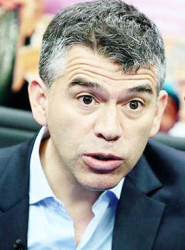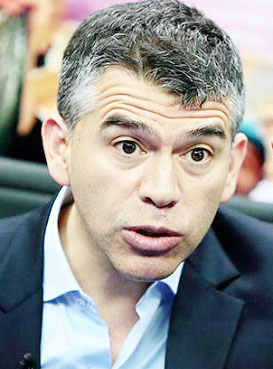LIMA, (Reuters) – Peru’s electoral board kicked the main rival to presidential candidate Keiko Fujimori out of the race on a technicality yesterday, removing the front-runner’s biggest obstacle to winning the office once held by her jailed father.

Fujimori, a center-right career politician and daughter of former President Alberto Fujimori, looks all but certain to win the April 10 first round after the board’s 3-2 decision against centrist technocrat Julio Guzman but she cannot be sure of securing the 50 percent needed to win outright.
The National Jury of Elections ruled Guzman cannot take part in the elections because his party failed to comply with electoral procedures when registering its presidential ticket.
Guzman had been the only candidate seen coming close to tying with Fujimori in a run-off vote, but voters could still punish her in the second round if they feel Guzman and another candidate, Cesar Acuna, were pushed unfairly from the race.
The election winner would replace President Ollanta Humala, whose five year term ends this year.
Guzman, little known just months ago, vowed to keep campaigning while exhausting all legal avenues to get reinstated. He also heaped pressure on the electoral board to bar four other candidates, including Fujimori, from the contest, citing similar questions over compliance with election rules.
“If their cases are not treated with the same criteria, the current election and potential elected authorities will be illegitimate,” Guzman said in a statement.
Fujimori’s opponents accuse her and her running mate of illegally dishing out gifts and prizes to voters while campaigning – accusations she called “absurd.”
The electoral board also rejected wealthy former governor and center-left populist Acuna’s appeal to stay in the race after he gave cash to poor voters while campaigning, in violation of a new law.
Acuna, who had sunk to fourth place amid allegations of plagiarism, said he accepted the decision even though he thought it was undemocratic. Unlike Guzman, Acuna’s party can still take part in elections and win congressional seats.
Recent opinion polls indicated the quarter of votes that Guzman and Acuna expected to draw in the first round would be split among several candidates, with Fujimori and former prime minister Pedro Pablo Kuczynski benefiting most.
Guzman said he would launch an “extraordinary” appeal before the electoral board, a move constitutional lawyers said was unlikely to succeed. Guzman said a delegation from the Organization of American States was traveling to Peru on Monday.
He said he would also seek the intervention of the local courts as well as the Inter-American Commission on Human Rights, processes that could take months.
Guzman’s candidacy bounced between electoral boards for more than a month, exasperating many Peruvians and stoking suspicions of foul play. The electoral board chief, who voted in favor of admitting Guzman, said last month he had received death threats.
Peru’s electoral board has not sparked so much controversy since 2000, when it let Alberto Fujimori run for a third term despite a constitutional ban. Fujimori is now serving a 25-year jail sentence for ordering death squads to conduct massacres in the fight to quash a leftist insurgency and for corruption.

